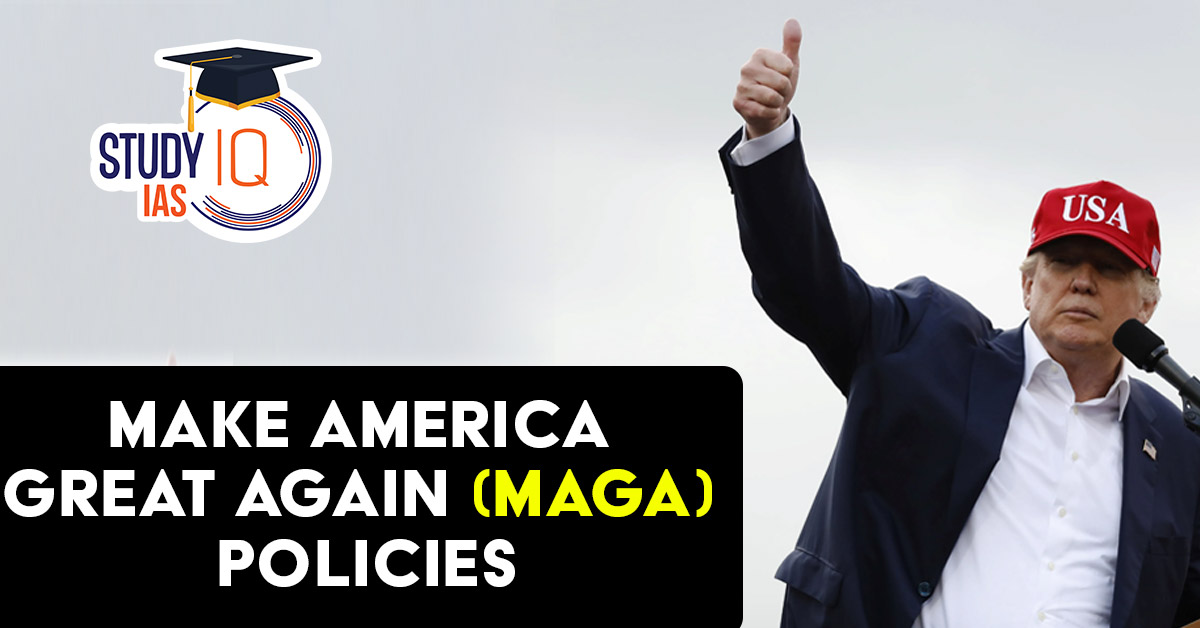Table of Contents
Context: Donald Trump’s “Make America Great Again” (MAGA) policies, especially aggressive tariffs and trade wars, have triggered significant responses across the globe. The ‘America First’ mantra is defining U.S. President Donald Trump’s administration, signaling a major shift for multilateralism and international law.
More in News
Since the beginning of Trump’s second term, the U.S. has withdrawn from key multilateral institutions and agreements it once helped establish, including:
- World Health Organization (WHO)
- United Nations Human Rights Council (UNHRC)
- Paris Climate Agreement
- Sanctions imposed on the International Criminal Court (ICC) and its officials.
Make America Great Again (MAGA) Policies Global Effects outside US
India: Reversal of Trade Barriers
- India has increased protectionism since 2016 by raising tariffs on over 500 item categories.
- However, Trump’s push for trade parity and tariff reciprocity forced India to rethink its stance:
- Basic customs duty cut on over two dozen items (e.g., bourbon, high-end cars).
- Average customs duty reduced to 66% from 11.66%.
- India is now trying to shed its image as a high-tariff economy.
China: Shift Toward Consumption-Led Growth
- US tariffs hurt China’s export sector, leading to a shift from an export-driven to a consumption-driven
- China’s 30-point action plan includes:
- Raising workers’ incomes.
- Addressing property market issues and improving annual leave policies.
- China aims to boost domestic confidence and stabilize growth at around 5%.
Europe: Increased Defence Spending
- Trump’s threat to withdraw US defence guarantees pushed Europe to enhance its security.
- Germany bypassed its “debt brake“ to increase defence and infrastructure spending:
- Proposed €500 billion investment fund for infrastructure.
- European Commission termed it a “watershed moment” in European security policy.
- Boost to growth expected, but fiscal constraints remain in countries like France and Italy.
Canada: Potential Pivot Toward the EU
- Trump’s unpredictability led Canada to explore stronger ties with Europe:
- 44% of Canadians support joining the EU.
- Increased trade between Canada and the EU could be mutually beneficial.
➡️ A potential shift in North American trade alliances.
US Dollar’s Reserve Currency Status Under Threat
- Trade wars and tariffs risk stoking US inflation and undermining foreign confidence in US debt.
- Central banks, including the RBI, have started buying physical gold instead of US dollar-linked assets.
- Threat to the dominance of the US dollar as the global reserve currency.
Global Trade Uncertainty
- Trump’s unilateral actions (e.g., violating USMCA terms) raised doubts about US commitment to trade deals.
- Retaliatory tariffs by China and the EU on American farm goods increased pressure on Washington.
- Increased volatility and reduced global trust in US trade agreements.
‘America First’ and Its Impact on Multilateralism and International Law
DEFUND Act and Political Isolationism
The Disengaging Entirely from the United Nations Debacle (DEFUND) Act was introduced.
- If passed, the DEFUND Act would:
- Repeal the United Nations Participation Act of 1945 and the United Nations Headquarters Agreement of 1947.
- Stop all U.S. financial contributions to the UN.
- End U.S. participation in UN peacekeeping operations.
- Revoke the functional immunity of UN officials in the U.S., hampering UN activities related to peacekeeping and human rights protection.
- This would weaken multilateral cooperation and undermine the rules-based international order established post-World War II.
Sanctions on the International Criminal Court (ICC)
On February 6, Trump signed an Executive Order imposing sanctions on the ICC.
- The ICC, based in The Hague, is the first permanent court for punishing individuals for crimes like:
- Genocide
- Crimes against humanity
- War crimes
- Historical Context: After World War II, the U.S. played a key role in setting up the Nuremberg Tribunal to hold individuals accountable for war crimes.
| Fact |
| Nuremberg Tribunal: It was the first international military tribunal to hold individuals accountable for crimes against humanity, setting a precedent for international criminal law. |
- The U.S. has not ratified the Rome Statute that established the ICC.
- The Executive Order accused the ICC of “illegitimate and baseless actions” against the U.S. and Israel, undermining the court’s credibility.
Economic Nationalism and Trade Protectionism
The Trump administration’s economic policies reflect a revival of economic nationalism, with aggressive tariffs imposed under the guise of national security.
- Historical Parallel: Similar to the Smoot-Hawley Tariff Act of the 1930s, which led to economic collapse and contributed to World War II.
- Post-War Recovery: Led to the creation of the General Agreement on Tariffs and Trade (GATT) in 1947, which evolved into the World Trade Organization (WTO).
Current Crisis
- The U.S. has blocked appointments to the WTO Appellate Body—crippling the WTO’s dispute resolution function.
- The threat of U.S. withdrawal from the WTO looms large.
Consequences of U.S. Unilateralism
- Growing U.S. opposition to multilateralism threatens global political and economic cooperation.
- The weakening of international institutions like the UN, WTO, and ICC would harm:
- Global health efforts (e.g., WHO)
- Environmental action (e.g., Paris Climate Agreement)
- Accountability for human rights violations (e.g., ICC)
- Economic stability (e.g., WTO)
- Retaliation from other states could isolate the U.S. and weaken its global influence.
- The “Make America Great Again” (MAGA) vision could falter without multilateral cooperation.
Role of Non-Western Nations (India’s Opportunity)
- The weakening of U.S. leadership creates an opportunity for emerging powers like India to take on a more prominent role in global governance.
- India’s consistent support for multilateralism and international law reflects its readiness for leadership.
- At the G-20 Foreign Ministers’ Meeting in Johannesburg (February 2025), Indian External Affairs Minister Jaishankar called for:
- An inclusive and multilateral approach to global challenges.
- Reform of the United Nations Security Council (UNSC) to reflect contemporary global realities.


 List of National Parks in India 2025, Ch...
List of National Parks in India 2025, Ch...
 Lipids, Types, Structure and Examples
Lipids, Types, Structure and Examples
 Bone Collector Caterpillar Wears the Bod...
Bone Collector Caterpillar Wears the Bod...





















